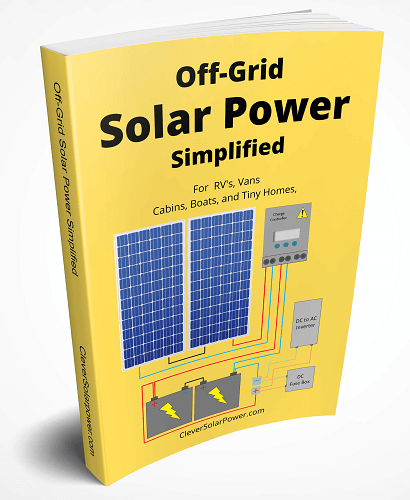If you’re considering going off the grid with your energy supply, you may wonder how off-grid solar power systems work.
What are off-grid power systems?
Off-grid solar power is a way to generate electricity using the sun’s energy without being connected to the traditional power grid.
This means that the electricity is generated on-site and is not dependent on a power company or utility.
Off-grid solar power systems are often used in remote locations where it is difficult or expensive to run power lines. They can provide a reliable electricity source and help reduce or eliminate monthly electricity bills.
How Off-Grid Solar Power Systems Generate Electricity
Off-grid solar power systems generate electricity using photovoltaic (PV) panels. PV panels are made up of photovoltaic cells that convert sunlight into electricity. The PV panels are mounted on the roof or another sunny location on your property.
The PV panels are connected to a solar inverter, which converts the DC electricity produced by the panels into AC electricity that can be used to power your home or business. The inverter is typically located in a central location, such as a utility room or basement.
The AC electricity is then sent to a load center, which distributes the electricity to the various circuits in your home or business. Any excess electricity is stored in batteries for later use.
Components of an Off-Grid Solar Power System
- Solar panels: Solar panels are made up of photovoltaic cells that convert sunlight into electricity. They are typically mounted on the roof or another sunny location on the property.
- Charge controller: A charge controller regulates the flow of electricity from the solar panels to the batteries. It helps to prevent the batteries from overcharging and ensures that they are charged efficiently.
- Batteries: Batteries are used to store excess electricity generated by the solar panels. Deep cycle lead-acid batteries are commonly used in solar energy systems because they are designed to be discharged and recharged repeatedly. Nowadays LiFePO4 batteries are taking over the market because they are cheaper in the long-run.
- Inverter: The inverter is a crucial component of a solar energy system because it converts the direct current (DC) electricity produced by the solar panels into alternating current (AC) electricity that can be used in your home or business.
- Load center or distribution board: The load center or distribution board is responsible for distributing the electricity from the inverter to the various circuits in your home or business. It may also include fuses or circuit breakers to protect the system from power surges and other electrical issues.
Sizing an Off-Grid Solar Power System
Properly sizing an off-grid solar power system is crucial to ensure that it meets your energy needs. There are several factors to consider when determining the size of your system, including:
- Your energy consumption: How much electricity do you use daily? This will help you determine the size of the solar panel system and the battery storage you need. For a normal American household, you will use around 10-15kWh of power daily. You must multiply this number by three to know your total battery capacity.
- The amount of available space: How much space do you have for the solar panels and other system components? The size of your solar panel system will depend on the available space.
- The type of solar panels you choose: Different types of solar panels have different power output ratings, so it’s important to consider the power output of your panels when sizing your system.
- The climate where you live: The amount of sunlight your area receives will also impact the size of your solar panel system.
Look at my off-grid solar calculator to estimate how many batteries and solar panels you need.
Advantages and Disadvantages of an Off-Grid Solar System
Advantages
- Energy independence: Off-grid solar power systems allow you to generate your own electricity, giving you the freedom to not rely on the traditional grid for your energy needs.
- Lower energy costs: With an off-grid solar power system, you can significantly reduce or eliminate your monthly electricity bills.
- Reliable energy: Off-grid solar power systems are a reliable energy source, as they are not affected by power outages or other disruptions to the traditional grid.
- Environmentally friendly: Solar energy is a clean, renewable energy source that does not produce harmful greenhouse gases or pollutants.
Disadvantages
- Initial cost: The initial cost of installing an off-grid solar power system can be expensive, although the long-term cost savings can offset this initial investment.
- Maintenance: Off-grid solar power systems require regular maintenance to ensure they are working efficiently and effectively.
- Limited energy production: Solar energy is dependent on the availability of sunlight, so your system may not be able to produce enough energy to meet your needs on cloudy or rainy days.
Conclusion: Is an Off-Grid Solar Power System Right for You?
Off-grid solar power systems are a great option for those who want to be energy independent and reduce their reliance on fossil fuels. They can provide a reliable source of electricity and significant cost savings in the long term.
However, installing an off-grid solar power system can be expensive. It requires regular maintenance to ensure it is working effectively. If you are considering going off the grid with your energy supply, it’s important to carefully weigh the advantages and disadvantages and determine if an off-grid solar power system is the right choice for you.
 I have written a book that contains all the information you need to get started with off-grid solar power.
I have written a book that contains all the information you need to get started with off-grid solar power.
With over 1,800 reviews at 4.5 stars, I can almost guarantee that this book will save you $100s on buying the right equipment.
You can get it here on Amazon.com

I’m an off-grid enthusiast. I created this website to give clear and straight-to-the-point advice about solar power. I’m also the author of the book ‘Off-grid solar power simplified‘. Read more about me on my about page, check out my Youtube channel, or send me a message.